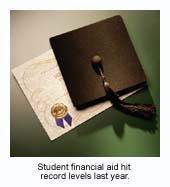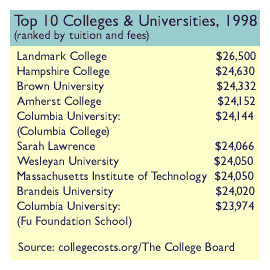|
Give it the old college try
|
 |
June 26, 2000: 9:15 a.m. ET
Higher education is costly, so get to work early at picking the right school
By Staff Writer Rob Lenihan
|
NEW YORK (CNNfn) - If you think a college education is expensive, then imagine of the cost of not having one.
The average bachelor's degree recipient earns about 75 percent more than someone with only a high school diploma, according to the College Board, and over a lifetime the earning potential gap between the high school diploma and a BA or higher degree will exceed $1 million.
A college admissions committee will spend about seven minutes reviewing your child's application, so experts say it is never to soon to prepare for your son or daughter's college education.
Some parents hire professional consultants to guide them through the complicated world of grants, scholarships and awards. And, as with so many other areas, the Internet serves as a vital tool to those in search of college-related information. The important thing is to take the choice of a college seriously, since the expense is great and the results are critical.
"I've seen people spend more time choosing a car than they do choosing a college," said Mark Fisher, president of Fisher Educational Consultants in Atlanta. "A college education is going to last a lot longer than a car."
Back to school
Nearly 90 percent of Americans believe a college education is as important as a high school diploma used to be, a survey prepared by research organization Public Agenda found, with African American and Hispanic parents valuing higher education the most. 
College tuition and fees in 1999-2000 increased less than 5 percent in all categories of institutions, the College Board said, the lowest rate of increase in the past four years. Room and board charges were up between 3.6 and 4.8 percent from the previous year.
"Colleges and universities are really people-driven places," said Travis Reindl, policy analyst with the American Association of State Colleges & Universities (AASCU). "The bulk of the expense is in salary and benefits."
For the 1999-00 academic year, the average tuition charged by public four-year colleges and universities was $3,356, up 3 percent from 1998-99.
Private four-year college tuition increased 4.6 percent to $15,380. There was also a record $64 billion available last year in student financial aid.
Yet the cost of a college education still grows at a faster rate than most family incomes. Since 1980, college costs have been rising at twice and sometimes three times the rate of the Consumer Price Index, the College Board said.
Joni Finney, vice president of the National Center for Public Policy and Higher Education, said college tuitions traditionally drop or stabilize when the economy is doing well. When the economy goes south, she said, tuitions usually rise.
Extra credit
Let's talk about money. Lots of it. You will want to hunt around for any information about financial aid.
Fisher said you should fill out the Free Application for Federal Student Aid, which is available at either your child's high school or on the Internet, where you can file it electronically. 
The information in the application is sent out to colleges you specify, eliminating the need for individual applications. You save time if you file the form via the Net, Fisher said.
Also, you should complete the CSS/Financial Aid Profile, which is located on the College Board Web site. Fisher also recommends the Web site FinAid, which provides information on financial aid, scholarships, military assistance and grants.
The site also features calculators that will tell you how much school will cost, how much you need to save and how much financial aid you will need.
"You can look at the tuition as the sticker price," said Steven Roy Goodman, an educational consultant. "Not everybody pays the sticker price."
Finney said federal tax credits are available for middle-income families in the form of the HOPE Scholarship and the lifetime learning credit. Several states are mimicking the federal offering, she said.
Once you've narrowed your list of schools, go to the financial aid offices and see what they have to offer.
Making the grade
Which college is right for your son or daughter? While the cost of tuition can be daunting, experts say your decision should not be governed by dollars alone.
"Looking at the price tag is not the way to do it," Fisher said. "If a school charges $25,000 per year and you qualify for $15,000 in financial aid, then your out-of-pocket expense is $10,000. Yet many people will look at the price tag without thinking about financial aid, and that's a big mistake."
Your local library or bookstore carries information about colleges and universities. Titles include "The College Board College Handbook", "The Fisk Guide to Colleges" and "Yale Insider's Guide." Software also is available to help you conduct your college search. 
Businesses routinely hire consultants. Perhaps you may want to do the same for your child's education. Goodman, who has been in business for 14 years, said people come to him for help from all over the world. The cost for his services starts at about $3,000.
"This is based on me getting to know them," he said. "You have to open up your mind to different possibilities before you put your list together. You know what your likes and dislikes are now, but perhaps what's also helpful is what you could have as likes and dislikes later on."
Goodman said the major colleges and universities have no incentive to lower their tuition because there is so much competition to get into them. However, lesser-known schools, which need students, are more inclined to offer incentives to attract better students.
Technology is certainly helpful, but Goodman cautions students and parents not to forget the human element.
"The Internet is wonderful," he said. "But the most important information you have to get is in your own heart and soul. Ultimately, you have to do some soul searching." 
|
|
|
|
|
 |

|

